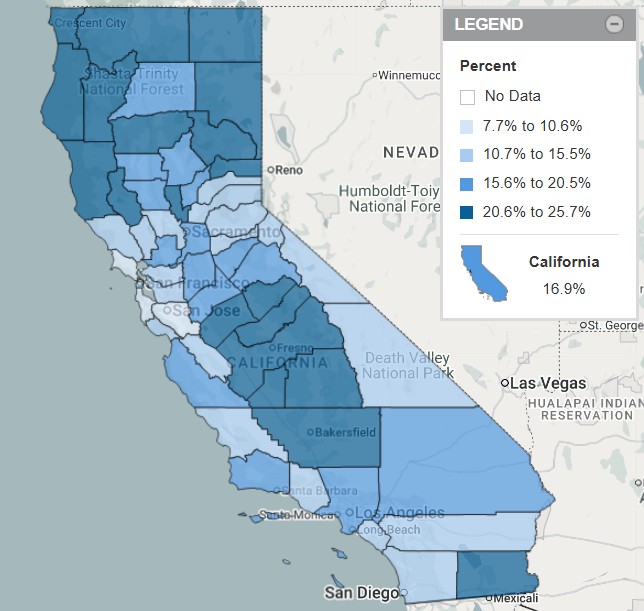Food Insecurity Impacts More Than 1 in 6 Kids
In response to the U.S. Department of Agriculture’s (USDA’s) recent decision to stop collecting data on household food insecurity, KidsData is exploring alternative sources for measuring childhood food insecurity in California.
Food insecurity—when a household lacks the money or other resources to provide consistent, dependable access to enough food for everyone in the household to enjoy active, healthy lives—is a major public health problem in California and across the nation. Compared with food-secure children, children experiencing food insecurity are at higher risk for a host of health problems with potentially lifelong impacts, including acute and chronic developmental, behavioral, mental, and physical health conditions.
Percentage of California Children Ages 0 to 17 Living in Food-Insecure Households: 2023
According to the latest estimates based on federal data sources, more than one in six California children live in a household experiencing food insecurity—up from around one in eight in 2020. This translates to over 1.4 million kids—more than the total child population of Massachusetts or Missouri—in 2023. In 26 of California’s 58 counties, at least one in every five children lived in a food-insecure household.
Food assistance programs such as the Supplemental Nutrition Assistance Program (SNAP, or CalFresh in California) provide a safety net to help low-income children and their families access adequate nutrition. Participation in these programs is shown to reduce poverty and improve overall health in childhood, and is linked to positive economic and health outcomes in adulthood.
CalFresh served nearly 5.5 million Californians, including nearly 2 million children, in July 2024. Compared with 10 years earlier, CalFresh participation in 2024 was up 22% for Californians of all ages but down 16% for Californians ages 0 to 17. See KidsData for policy options to boost nutrition program access, participation, and benefits for children and families in need.
KidsData in the News
A Merced FOCUS story about obesity rates in San Joaquin Valley counties cites KidsData’s indicators of students who are overweight or obese, which are featured in the California Health Care Foundation’s 2025 California Latino Health Dashboard.
Children’s Health Resource
The Impact of Positive Childhood Experiences (PCEs) on Behavioral Health Outcomes
A new resource from the California Essentials for Childhood Initiative looks at how PCEs shape behavioral health outcomes in adulthood and describes strategies to promote positive experiences, environments, and relationships during the early years.
Posted by kidsdata.org
This entry was posted on Wednesday, November 26th, 2025 at 10:37 am. You can follow any responses to this entry through the RSS 2.0 feed. You can leave a response, or trackback from your own site.



